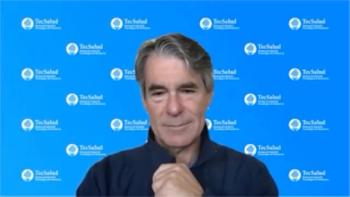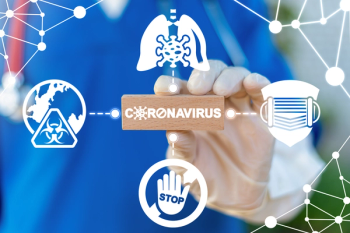
Jason Ausili, PharmD, the Chief Clinical Officer of FDS Amplicare, discusses the impact on community pharmacies and patients of the recent announcement by the HHS regarding the amendment to the COVID-19 PREP Act.

Jason Ausili, PharmD, the Chief Clinical Officer of FDS Amplicare, discusses the impact on community pharmacies and patients of the recent announcement by the HHS regarding the amendment to the COVID-19 PREP Act.

Aaron Clark, DO, medical director of value based care at Ohio State University and clinical associate professor of family medicine, discusses vaccine hesitancy and racial disparities around flu vaccinations.

In The Legal Prescription series with Ned Milenkovich, we discuss a set of important topics in the pharmacy landscape.

A panel of experts from various settings in the pharmacy field discuss the application of cultural humility and their own experiences when providing culturally appropriate care to underserved or marginalized populations.

Lola Fashoyin-Aje, MD, MPH, associate director of Science & Policy Program to Address Disparities at the FDA’s Oncology Center of Excellence, discusses the importance of promoting inclusion of members of racial and ethnic minority groups in cancer drug trials.

Dupilumab (Dupixent) was approved in 2017 for the treatment of adults with moderate-to-severe atopic dermatitis whose disease is not adequately controlled with topical prescription therapies.

Unlike other medications for chronic idiopathic constipation, prucalopride works by enhancing colonic peristalsis to increase bowel motility.

Peter Koshland, PharmD, CEO of Koshland Pharm and a practicing pharmacist, discusses whether the process may be similar in the future in terms of compounding pharmacies’ role in the administration of psychedelic drugs like psilocybin.

Harry Webster, RPh, a registered pharmacist at Walgreens and a member of the LGBTQIA+ community, discusses the impact of stigma associated with PrEP and HIV on patients seeking to treat or prevent HIV.

Michael Ganio, PharmD, MS, BCPS, FASHP, Senior Director of Pharmacy Practice and Quality at the American Society of Health-System Pharmacists, discussed the recent strains for hospitals due to the newest wave of COVID-19.

Peter Koshland, PharmD, CEO of Koshland Pharm and a practicing pharmacist, discusses how compounding pharmacies manage quality assurance when putting together ketamine dosages for patients.

Panelists share final thoughts and advice regarding the critical role pharmacy has played and continues to play in public health initiatives.

Christie Boutte, PharmD, RPh, also discussed how the FDA approval gives pharmacists more tools to encourage patients who may be hesitant about vaccination.

Pharmacy Times spoke with Ilisa Bernstein, APhA senior vice president, Pharmacy Practice and Government Affairs, about the latest FDA approval of the Pfizer-BioNTech COVID-19 vaccine.

Experts from Emory Healthcare and Winship Cancer Institute discuss the management of oncology patients by pharmacists within an NCI-designated comprehensive cancer center.

Doug Long, vice president of industry relations at IQVIA, and Scott Biggs, director of supplier services, discussed their session at the 2021 National Association of Chain Drug Stores (NACDS) Total Store Expo titled "Pharmaceutical Trends, Issues, and Forecasts."

In an interview with Pharmacy Times®, Guillermo Torre-Amione, MD, PhD, FACC, the chairman of Cardiol Therapeutics, discusses the potential use for CBD in hospitalized patients with COVID-19, as well as its therapeutic benefits in certain patients with cardiovascular disease.

Patricia C. Kienle, RPh, MPA, BCSCP, FASHP, director of Accreditation and Medication Safety at Cardinal Health and member of US Pharmacopeia’s (USP) Compounding Expert Committee, and Nicole Palmer, the senior manager of USP Volunteer Operations, discuss USP’s volunteer program.

John Beckner, RPh, discusses the importance of collaborating with the medical community on the provision of immunization services.

Pharmacy Times spoke with Dr. Trishia Shaw, the Clinical Assistant Professor of Pharmacy Practice at Chicago State University College of Pharmacy, on her presentation at the NPhA conference titled “Who’s your Provider”—Updates in Provider Status for Pharmacists.

Relugolix is an orally administered treatment for prostate cancer that works by blocking the pituitary gland from making luteinizing hormone and follicle-stimulating hormone.

In an interview with Pharmacy Times®, Sachin Nagrani, MD, medical director at the home visit and telemedicine service Heal, discusses the Biden administration's announcement that booster shots will soon be available for the Pfizer and Moderna vaccines, and what this would mean for patients and practitioners.

In the latest Student Cafe interview series, students from the University of Texas at Austin College of Pharmacy discussed the future of pharmacy after the COVID-19 pandemic.

Pharmacy Times spoke to ASHP’s Vice President of Government Relations Tom Kraus about the recent actions from ASHP urging the HHS to allow pharmacists to provide COVID-19 prophylaxis treatment.

Brad McElya, PharmD, director of specialty health solutions at Walgreens, discusses the critical role pharmacists play in providing HIV prevention drugs in communities across America.

Peter Koshland, PharmD, CEO of Koshland Pharm and a practicing pharmacist, discusses the role of the pharmacist in ketamine therapy.

Alexandra S. Wolff, PharmD, BCOP, comments on her experience with CPX-351 in clinical practice and the potential to combine CPX-351 with targeted agents for AML.

In the latest Student Cafe interview series, students from the University of Texas at Austin College of Pharmacy discussed the future of pharmacy after the COVID-19 pandemic.

Alexandra S. Wolff, PharmD, BCOP, explores the 5-year follow-up data from the phase 3 trial of CPX-351 in AML.

Expert continues discussion on important considerations for the optimal use if venetoclax in patients with AML, such as CYP3A4 and p-glycoprotein drug interactions.